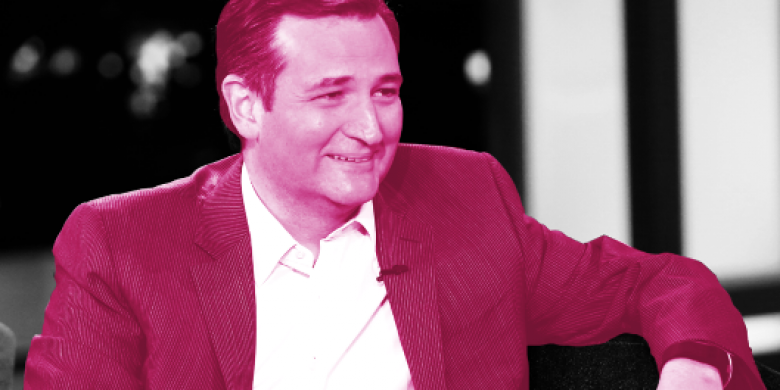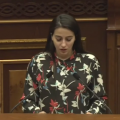3 Millennial Women Explain Why They Support Ted Cruz
Society
Texas Sen. Ted Cruz has been shoring up the support of Tea Party Republicans, ultra-conservatives, and born-again Christians in a quest to edge out current Republican front-runner Donald Trump in the presidential nomination. Cruz, who remains somewhat isolated in his own party after leading the government shutdown in 2013, is ideologically further to the right than every other Republican candidate who entered the primary contest. The rise of Trump hasfractured the Republican party, however, and it seems that Republican leadership who were initially wary of Cruz are backing him in an effort to block the real estate mogul from gaining ground. To his longtime supporters, Cruz is the unyielding conservative and constitutionalist who could take the party back it to its roots. Cosmopolitan.com spoke to three millennial women who support Cruz about why they believe he should become the next president of the United States.
Why do you support Ted Cruz?
Inez Feltscher, 28, education policy expert in Washington D.C: I support Ted Cruz, first and foremost, because he is the one that I hear talking the most about the Constitution and about constitutional limits on government.
Joy Pullmann, 29, editor based in Indiana: I have never looked at a presidential candidate and thought this is my Messiah. So I basically picked a candidate who fits closest with my views of the folks that are available. I see the biggest problem facing America today is tied up with the fact that our government isn't living up to many of its promises. And fundamental to those promises is that we have individual freedoms that government doesn't interfere with our daily working out of our lives and the decisions that we make.
What issues do you care about most in the election and what policies of his do you really like?
Allison Peregory, 21, junior at University of Texas-Austin and chairman of the UT chapter of Young Conservatives of Texas: One big issue that Ted Cruz is a big supporter of is Second Amendment freedoms protected for Americans everywhere. We've seen attacks on those liberties happening in recent years, under the Obama administration, so I think Ted Cruz will be an awesome defender of our Second Amendment liberty.
I really like Ted Cruz's tax plan. He has a tax plan that's like a flat tax – I think it's a 10 percent tax. So everybody would have the same rate, but the first [$36,000] wouldn't be taxable for families. I think that could be really, really beneficial for Americans because I think it would promote a lot of job growth. I think it would put a lot of money back into people's pockets.
I think that Ted Cruz is a good supporter of traditional family values. And I think that he's done an awesome job, especially in Texas, defending the unborn. I think that a lot of pro-life Republicans have been saying that Ted Cruz is doing constantly a good job at trying to defend the pro-life cause, and I really think that Ted Cruz would bring that back to be a issue of the state. On a federal level, I think Ted Cruz would do a good job to investigate Planned Parenthood – I think that's something that's really important and I think that's something that Republican voters are playing a lot of attention to.
Feltscher: I really like his education policies. He dropped a universal education savings account bill in Congress, and he had always been a strong proponent of school choice – that is really important to me obviously, given what I do for a living. And then I like, actually, indications of his principled stands on things. One, taking a stand against ethanol subsidies while running in Iowa. Ethanol subsidies, not in my maybe top three issues, but the fact that he is willing to take a stand against cronyism absolutely is one of my top issues because I think that it's really important that the Republican party and conservatives stand for free-market solutions and I think it really undermines that when people turn around and vote for things like the Farm Bill.
Pullman: Some basics — I'm a pro-life voter. Straight up. So that attracts me to Ted Cruz. Some other things – I kind of don't think that government should be really involved with a lot of the social issues, private things [like] arrangements between people, between friendships. A lot of the marriage issue and so forth, but now that that's happened, I think again I support someone who is pushing for government to get out of our lives and not be telling everybody what they need to do.
If we set the social issues aside, what actually is the core issue for me when I think about a president of a federal government, is national defense and our economic issues. I've been so frustrated by the fact that every single American citizen owes about, I think more than $50,000 each. But the size of the federal debt and the size of our entitlement state is so big that we really can't pay it off. And so me and my kids are the ones who are paying all the current benefits and the future benefits promised to everybody who voted for them long ago, but we are not going to be getting those same benefits. I don't even want those benefits. I want to be free to take care of my own retirement, I want to be free to take care of my own kids' education, my own education, but instead I am taxed.
Donald Trump is seen as a divisive figure amongst Republicans, but the Republican party seems to see Cruz as a divisive figure as well. Does that bother you?
Peregory: I think Donald Trump and Ted Cruz are divisive on different fronts. I don't even know what to call Donald Trump's support base. I wouldn't even call them a grassroots Republican effort because I hate to even call them Republicans, but I think it's divisive in a different sense in that I think Ted Cruz consistently champions conservative values and I think he kind of scares establishment Republicans because he doesn't back down from his conservative values to make it more of a political agreement. I don't think the American people are divided by Ted Cruz, but I do think American people are divided by Donald Trump.
Feltscher: No, it doesn't bother me. That's something I like about him, because I think he is divisive for the right reasons. He is divisive because he stood for conservative principles. I'm not a huge fan of how the Republican party has conducted itself since Ronald Reagan. I'm not interested in pouring my heart and soul into defending a party that is essentially just implementing progressive policies but selling them as, "Oh, we can manage them better, we'll balance the budget, but we're not going to touch, for example, any of the New Deal programs, we're not going to actually challenge any of the progressive paradigms." I applaud Ted Cruz for actually being one of the few Republicans who is willing to stand up to essentially deals that always, in the view of myself and a lot of Tea Party conservatives, are always going one way, always in the direction of growing more government.
How will Ted Cruz help women?
Peregory: A lot of the time that issue gets reduced down to abortion and women's health care things, and I think Ted Cruz has been painted with kind of an ugly brush from a lot of very liberal feminist organizations because they feel Ted Cruz doesn't support your rights to abortion and Ted Cruz doesn't want you to have like access to birth control or anything like that. I don't think that's a fair assessment at all because I don't personally think that abortion is a women's rights issue. I think that it's just as important to protect an unborn baby as it is to protect a woman's right to an abortion. I think that Ted Cruz would protect women, or do a service to women, in the sense that I do think that he will bring a lot of women's rights issues back down to the state level and not a federal level, so that way that states and communities have the ability to voice what they think is best for women in that area. I think that it's kind of ridiculous to expect a one size-fits-all fix for the entire country because values in one state are going to be different than another.
Feltscher: I think Ted Cruz will help women by growing the economy, by reducing regulations, by getting rid of cronyist deals, by starting to constrain the government to more constitutional bounds. I think all of those things help women, but I don't think they help only women. They help Americans, therefore they help women – that's how I think about it.
Pullmann: I don't think about someone in terms of, "Is he going to help me because I have different body parts than someone?" I'm going to think about a more unifying question. Like, "Is he going to help me as an American? Is he going to do his job as the president?" I don't feel like that's an appropriate criteria to apply to a presidency. In fact, it's really offensive to me when people suggest that I should vote for Hillary Clinton because we both have vaginas. That's so demeaning. I feel really insulted when there's kind of this feeling at the workplace that I might be getting ahead because I am the diversity woman hire – that's so offensive to me. I want to be hired and promoted because I am kickass, because I have the best resume, because I work my butt off, because I am absolutely hands down the best candidate to lead whatever position someone is hiring me for. So if you are someone like Hillary Clinton, who gets out there and campaigns and, for example, Madeleine Albright is saying women are going to go to hell if they don't support other women — I don't know, it's a symbol of why feminism is stuck in the past.
Some of his critics say that some of his stances on abortion, on gay marriage, even on immigration and terrorism are very hard line or extreme. Do you agree or disagree?
Peregory: I personally support the right of gay couples to marry, but I do believe it is an issue for the states to decide. I don't think that that's something, again, that should be a one-size-fits-all solution for everywhere, like a federal decision. I do think it should be decided at the states, because states are who issue our marriage licenses.
Feltscher: On immigration, I think that Ted Cruz's position, especially during the Gang of Eight– that's one of the things I admire about him. My family immigrated here, I was born here by about six weeks, but I think it's very important that we have an orderly process and that people coming to this country follow the rule of law. My parents did it the right way. They went through the system, it took years, and I think that it's totally unfair for people to expect or assume that they should be able to potentially sneak into the country and then to essentially gain all of the legalized rights of citizenship or even illegal status.
On gay marriage, I think, again this is one of those times where I think that Cruz really shows his constitutional bona fide and that he understands that marriage is a state issue. I very specifically disagree with the Supreme Court decision — this ties into abortion as well — on abortion and gay marriage because I think both of those things should be regulated by the states. These terms are sort of meaningless to the way that they get bantered around, [but] I'm pro-life and OK with gay marriage. I voted for gay marriage in California when it was a state issue, but I think that those are constitutionally wrong decisions.
What do you think of his proposal to surveil Muslim neighborhoods in light of the Brussels attacks?
Peregory: I think it's important to note that there's never going to be a perfect candidate and there's never going to be a candidate where you support them on every single issue and every single talking point. That's just unrealistic. I think one of the important pillars of American society is religious liberty and I think that protects all religions. So, no, I don't support the idea that we should have patrolling of Muslim neighborhoods.
Pullmann: What he actually called for and he supported was an effective program that has worked in New York City before Muslim Brotherhood-linked organizations managed to clammer loud enough to shut it down. It was police officers using public space like police officers already do, going where you and I can go, to see what you and I can see, and to track patterns of criminal behavior, again, not sending drones into people's backyards, you know, not posting cameras, not having police headscarf-check people or anything creepy — [they're] doing completely normal police things. But only focusing on neighborhoods where they were seeing patterns of activity. Yeah, I support him. [Editor's note: According to CNN, the New York program never led to a terrorism investigation by the NYPD.]
Ted Cruz has said that he opposes including women in the military draft. How do you feel about that?
Peregory: I don't personally think that the draft should even exist in the first place. I think military service should be something that we instill through patriotism. It's something that people want to volunteer for and something that people want to do. I don't think military service should be forced upon anybody, regardless of gender.
Feltscher: I have the opposite stance as most people, I actually don't think that women should be included in combat or should be able to even volunteer for combat missions, but I think they should be included in the draft. If we are really in the kind of dire straits that we needed to have a draft, I think that women should be included to take a lot of non-combat positions. And freeing up men to go into combat positions.
Pullmann: I strongly, strongly oppose including women in the military draft. Look, the draft is instituted in a time of extreme national emergency. And it's selective. They pick young men, maybe between the ages of 18 and maybe 25, so it's basically human beings who are at the peak of their strength because that's what you need for a draft, when your nation is in those circumstances. The very best female athletes cannot physically beat an average man. So it's just ridiculous to think that in a time of military need, we should be sending people that we know are physically not going to be the best that we are going to be needing on the front line.
































































